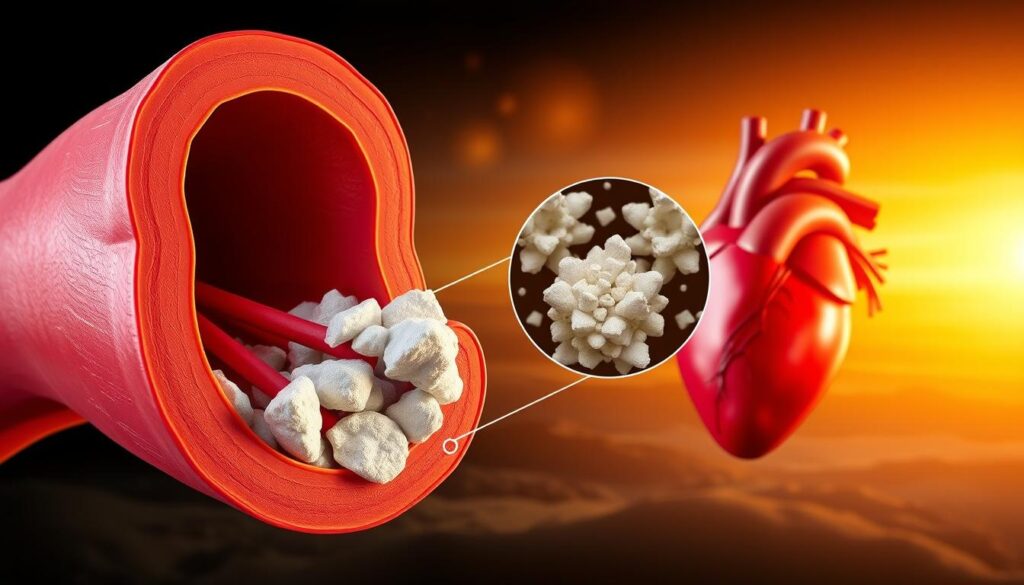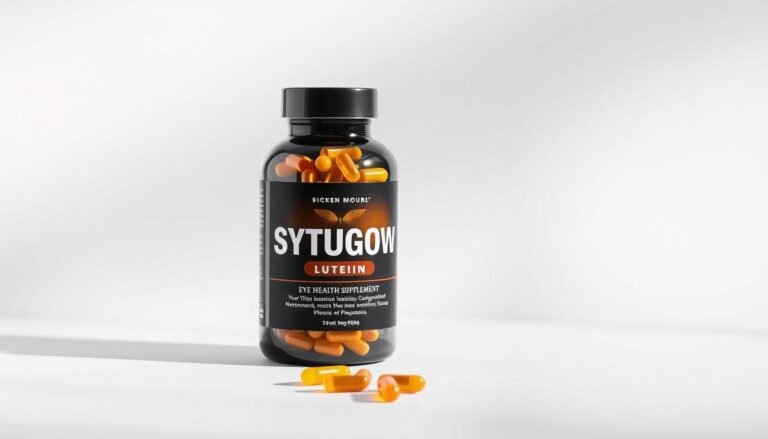Vitamin D3 K2: Essential Vitamins for Bone & Heart Health
Table of Contents
Discover the power of vitamin D3 K2, a duo that boosts your bone and heart health. Sadly, most Americans lack enough vitamin D. Learning about these vitamins can change your health game.
Recent studies show vitamin D3 and K2 are a game-changer. They team up to keep your body running smoothly. They help your bones get stronger and your heart stay healthy. This duo is key to good nutrition and preventing health issues.
Your body needs these vitamins, but many don’t get them. Vitamin D3 and K2 are more than supplements. They’re your shield against aging and keep your muscles strong and your immune system ready.
Key Takeaways
- 95% of adults are deficient in vitamin D
- Vitamin D3 and K2 work synergistically for optimal health
- Supports bone mineral density and cardiovascular function
- Helps prevent age-related health decline
- Critical for immune system and muscle strength
- Recommended daily intake varies by age and health status
Understanding the Dynamic Duo of Vitamin D3 and K2
Vitamin D3 (cholecalciferol) and K2 (menaquinone) are a powerful team. They change how you think about nutritional supplements. Together, they help your body absorb calcium better and stay healthy in ways single supplements can’t.
The Synergistic Relationship Between D3 and K2
When these vitamins work together, your body wins big. Vitamin D3 boosts calcium absorption in your gut. K2 makes sure calcium goes to your bones and teeth, not to your arteries or soft tissues.
- D3 increases calcium uptake from your digestive system
- K2 directs calcium to optimal locations in your body
- Prevents potential arterial calcification
- Supports bone density and cardiovascular health
Why These Vitamins Work Better Together
Nutritional experts say D3 and K2 together are better than alone. The Endocrine Society suggests vitamin D levels should be between 40-60 ng/dl. This shows how important it is to get the right amount.
Key Benefits of Combined Supplementation
Choosing supplements with both D3 and K2 means you’re getting a big health boost. These vitamins work together to:
- Optimize calcium distribution
- Strengthen bone structure
- Support cardiovascular health
- Enhance overall nutrient absorption
Consult your healthcare provider to determine the ideal dosage for your specific health needs.
The Science Behind Calcium Absorption and Distribution
Knowing how calcium is absorbed is key for strong bones and heart health. Your body needs vitamins D3 and K2 to get calcium to the right spots.
Vitamin D3 is vital for calcium absorption. About 42% of Americans lack vitamin D, which affects calcium processing. Vitamin D3 helps your intestines soak up calcium from food better.
“Calcium is not just about intake, but about proper absorption and distribution”
Vitamin K2 guides calcium in your body. It activates two important proteins:
- Osteocalcin: Moves calcium into bones
- Matrix GLA protein: Stops calcium from building up in arteries
It’s important to follow daily intake guidelines:
- Calcium supplements: No more than 500 mg a day
- Vitamin K2 (MK-7): Up to 300 mcg daily
- Vitamin D3: 1,000-2,000 IU for bone health
Magnesium is also key. It helps turn vitamin D into its active form and stops calcium from building up where it shouldn’t.
By grasping these complex processes, you can help your body absorb calcium better. This supports bone strength and heart health.
Essential Functions of Vitamin D3 in Your Body
Vitamin D3, also known as cholecalciferol, is key to your health. It supports many body systems. This makes it vital for your daily health.
Knowing how vitamin D3 benefits your body is important. It helps your body work at its best. Let’s look at where it makes a big difference.
Bone Strength and Density Support
Vitamin D3 is great for your bones. Studies show it helps prevent bone problems and keeps bones strong. Here are the main benefits:
- Supports calcium absorption for stronger bones
- Helps prevent osteoporosis
- Reduces risk of fractures, especially in older adults
- Promotes optimal bone mineralization
Immune System Enhancement
Vitamin D3 boosts your immune function. Research shows it’s linked to your body’s defense:
- Activates immune cells to fight infections
- Reduces inflammation
- May lower risk of respiratory infections
- Supports overall immune system resilience
“Vitamin D3 is like a natural shield for your body’s defense system.” – Nutrition Research Institute
Muscle Function Optimization
Vitamin D3 also helps with muscle health. It keeps muscles strong and prevents them from weakening with age. Key benefits include:
- Improving muscle strength and coordination
- Reducing risk of falls in older adults
- Supporting muscle recovery and performance
- Enhancing overall physical mobility
The daily amount needed varies by age. Adults usually need 600-800 IU. Consulting with a healthcare professional can help you determine the right dosage for your specific needs.
Vitamin K2’s Role in Cardiovascular Health
Keeping your heart healthy is key, and vitamin D3 K2 is a big help. Menaquinone, or vitamin K2, is a strong partner in keeping your arteries in good shape. It helps prevent heart problems.
Heart disease is the top killer globally, with over 20.5 million deaths in 2021. Vitamin K2 is a natural way to lower these risks. It tackles major heart health issues.
- Activates matrix GLA protein to prevent calcium buildup
- Improves arterial flexibility
- Reduces risk of arterial calcification
- Supports healthy blood pressure regulation
Research shows vitamin K2 is great for your heart. For every 10 mcg of vitamin K2 you eat, you might see:
- 50% less heart disease deaths
- 25% less chance of dying from any cause
- 9% less risk of heart disease
“Vitamin K2 is not just a vitamin, but a cardiovascular guardian protecting your arterial health,” says leading cardiovascular researchers.
The MK-7 form of vitamin K2 is special because it stays active in your body. It works well with vitamin D3 to keep calcium in your bones, not in your blood vessels.
Your heart needs all the help it can get. Adding vitamin D3 K2 to your routine could be a big win for your heart health over time.
Optimal Dosage and Supplementation Guidelines
Finding the right amount of vitamin D3 and K2 supplements can be tricky. Knowing how much to take is key to getting the most health benefits.
How much vitamin D3 and K2 you get from food matters a lot for your health. Experts have set guidelines to help you choose the best supplements:
Recommended Daily Intake
The right amount of supplements varies for everyone. Here’s what experts suggest:
- Adults usually need 5,000-10,000 IU of vitamin D3 each day
- It’s best to take 90-120 mcg of K2 daily
- The best ratio is 10 mcg of K2 for every 1,000 IU of D3
Best Time to Take Supplements
When you take your supplements can affect how well your body absorbs them. Here are some tips for better absorption:
- Take them with a meal that has healthy fats
- It’s best to take them in the morning or midday
- Don’t take them right before bed
Absorption Maximization Tips
| Strategy | Benefit |
|---|---|
| Pair with fatty foods | Helps your body absorb fat-soluble vitamins better |
| Take them every day | Keeps your nutrient levels steady |
| Avoid too much | Stops you from getting too much of a good thing |
“The key to effective supplementation is finding the right balance for your individual health needs.” – Nutrition Experts
Always talk to a doctor to find the best dosage for you. Remember, supplements are meant to help, not replace a healthy diet and lifestyle.
Preventing Calcium Buildup in Arteries

Keeping your arteries healthy is key for a strong heart. Calcium buildup in arteries can cause big health problems. But, vitamin D3 and K2 together can fight off this buildup.
Research shows how these vitamins team up to protect your heart. Vitamin K2 is special because it helps stop calcium from building up in arteries. It makes sure calcium goes to your bones instead.
- Vitamin K2 activates matrix Gla protein (MGP)
- Helps remove excess calcium from arterial walls
- Directs calcium to bone tissue where it’s beneficial
Studies show the big difference vitamin D3 and K2 make for your heart. In one study, people taking vitamin K2 (720 µg/day) and vitamin D3 (25 µg/day) had less calcium buildup in their arteries. Their calcium buildup was much lower than those who didn’t take the vitamins.
Vitamin D and K2 work together to help your body use calcium right. This protects your arteries from harmful buildup.
By keeping calcium in balance, you help your heart stay healthy. Vitamin D3 and K2 are important for keeping your arteries safe as you get older.
Benefits for Bone Health and Density
Keeping your bones strong is key for your health and how well you move. Vitamin D3 and K2 are a great team for your bones. They help your body use calcium right and keep your bones dense.
Without enough vitamin D3, your body can only use 10-15% of calcium from food. This can weaken your bones. Vitamin K2 is important because it helps calcium stick to your bones.
Impact on Osteocalcin Production
Osteocalcin is a protein that helps build bones. Vitamin K2 turns this protein on, so it can add calcium to your bones. Studies have found that:
- Vitamin K2 lowers levels of underactive osteocalcin
- Good osteocalcin helps keep bones strong
- Active osteocalcin spreads calcium well in bones
Prevention of Osteoporosis
Osteoporosis is a big problem, affecting about 20% of people worldwide. Vitamin D3 and K2 together can stop this by keeping bones strong and lowering the chance of breaks.
| Vitamin Benefit | Bone Health Impact |
|---|---|
| Vitamin D3 | Increases calcium absorption by 10-15% |
| Vitamin K2 | Activates bone-binding proteins |
| Combined Effect | Improved bone mineral density |
“Vitamin D3 and K2 are your nutritional allies in maintaining strong, healthy bones.” – Nutrition Experts
Vitamin D3 and K2 help your body use calcium better and turn bone proteins on. This keeps your bones healthy as you get older. Taking supplements and eating well are important to stop bones from getting weaker.
Immune System Support and Enhancement
Your immune function is key to fighting off health issues. Vitamin D3 and K2 are strong allies for your immune system. They work together to boost your immune system’s strength.
Vitamin D3 is a major player in immune system health. Studies show it helps activate and control immune cells. This makes your body’s defense stronger. Vitamin D3 and K2 also help keep your immune response in balance.
- Boosts production of immune defense cells
- Supports natural inflammatory responses
- Enhances overall immune system functionality
Having enough vitamin D3 K2 helps keep your immune system strong. Research shows these vitamins are important for lung health and fighting off infections. Getting enough of these vitamins helps your immune system stay healthy.
Maintaining balanced immune function is key to long-term health and wellness.
Adding a good vitamin D3 K2 supplement to your routine can help your immune system. These vitamins together help keep your body’s defenses up.
Quality Standards and Manufacturing Practices

Choosing nutritional supplements means understanding how they’re made. This is key to getting the best quality for your diet. Making Vitamin D3 and K2 supplements needs careful attention and strict quality checks.
People want to know how their supplements are made. The best makers follow strict quality rules that go beyond the basics.
Third-Party Testing Protocols
Third-party tests are vital for supplement trust. They check if supplements are pure, strong, free from harmful stuff, and real.
- Purity verification
- Potency confirmation
- Contaminant screening
- Ingredient authentication
Production Guidelines
Top supplement makers stick to strict rules for quality. Being certified in Good Manufacturing Practices (cGMP) is the top mark.
Important production rules include:
- Gluten-free certification
- Allergen-free processing
- Non-GMO ingredient sourcing
- Soy protein-free manufacturing
About 66.67% of vitamin K2 supplements don’t meet label promises, showing the need for strict quality checks.
Quality is not an act, but a habit in supplement manufacturing.
By focusing on these quality standards, makers can make sure your supplements work well and are safe.
Natural Sources of Vitamin D3 K2
To get more vitamin D3 k2, know the best natural sources. While it’s hard to get these vitamins from food, some options can help a lot.
Sunlight is the main way to get vitamin D3. Your skin makes this important nutrient when it’s exposed to UVB rays. This usually happens between 10 AM and 2 PM when it’s sunny.
Experts say you need 10-30 minutes of sunlight, depending on your skin color.
Top Food Sources for Vitamin D3
- Fatty fish (salmon, mackerel, sardines)
- Egg yolks from pastured chickens
- Beef liver
- Fortified dairy products
Natural Vitamin K2 Rich Foods
- Natto (fermented soybeans)
- Grass-fed dairy products
- Fermented foods like sauerkraut
- Certain aged cheeses
Pro tip: Since these are fat-soluble vitamins, eat them with healthy fats to help your body absorb them better. Sadly, 95% of Americans don’t get enough vitamin D from food alone. That’s why taking supplements is key for staying healthy.
Remember, whole food sources provide natural nutrients that work together in your body.
When picking supplements, choose high-quality vitamin D3 k2 blends. They should help your body absorb nutrients like it does naturally. This supports your bones, heart, and immune system, thanks to smart food choices.
Common Signs of Deficiency
Knowing the signs of vitamin D3 and K2 deficiency is key to keeping your bones and heart healthy. Many people don’t notice these important vitamin shortages until serious health issues arise.
Vitamin D3 Deficiency Symptoms
Your body gives you clear signs when it lacks vitamin D3. Look out for these important signals:
- Persistent fatigue and weakness
- Frequent muscle aches and cramps
- Bone pain and increased fracture risk
- Weakened immune system
- Slow wound healing
About 35% of people with obesity might not have enough vitamin D3. Spotting these signs early can stop serious health problems later.
Vitamin K2 Deficiency Indicators
Vitamin K2 is vital for your bones and heart health, especially when working with vitamin D3. Look out for these signs of a deficiency:
- Easy bruising
- Increased tooth decay
- Poor dental health
- Reduced bone density
- Potential arterial calcification
Research shows that not enough vitamin K2 can harm your health. It can lead to heart problems and weaker bones.
Conclusion
Exploring vitamin D3 and K2 shows how they can boost your health. They help your body use calcium better, which is key for strong bones and a healthy heart. This duo is a powerful way to support your body’s needs.
Vitamin D3 and K2 do more than just fill a nutritional gap. They guide calcium to where it’s needed most, making bones stronger and hearts healthier. Taking care of your nutrition can prevent serious health issues.
Choosing the right supplements is important. The amount you need changes with age and health. Talking to a doctor can help you find the right mix for you. Using vitamin D3 and K2 in your diet and supplements can help you stay healthy for the long run.
Good health is more than just supplements. Vitamin D3 and K2 are part of a bigger picture. By making smart food choices and staying informed, you can keep your body working well. This helps you stay healthy and feel your best.







